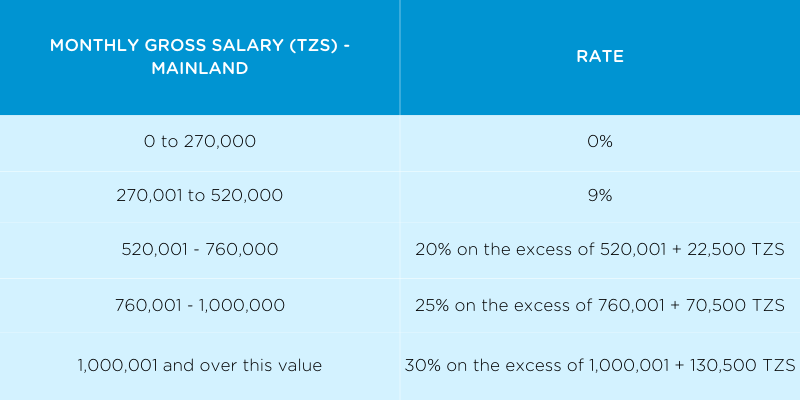
By
Leanna Seah
April 9, 2023
Updated
October 17, 2024

Overview
Tanzania is a unique and fascinating country that is rich in history, culture, and natural beauty. Home to some of the most iconic wildlife reserves and scenic landscapes in the continent, it is a popular destination for travellers and adventurers from around the world.
Tanzania's economy is largely based on agriculture and mining, with a Gross Domestic Product (GPD) of 67.8 billion USD (79th in the world) and a Human Development Index (HDI) of 0,549 (160th in the world and 30th in Africa). Tanzania also has a literacy rate of 81.8% with a substantial growth in the last decade.
| Capital |
Dodoma |
| Languages spoken |
English and Swahili |
| Population size |
63.5 million |
| Payroll frequency |
Depends on company policy. Most common are daily, weekly, bi-weekly, and monthly |
| Currency |
Tanzanian Shilling - TZS |
| VAT |
Standard VAT of 18% in Mainland Tanzania; in Zanzibar, the rate is 15% |
Payroll and taxes
Employer contributions
The contributions that employers are obliged to make are the following:
- 10% to Workers Compensation Fund
- 5% to Skill Development Levy
In Tanzania, the total employment cost is 15% of the total salary of each employee. The country has one of the lowest employer tax rates in the world.
Employee contributions
In Tanzania, there is only one contribution for employees, except when there’s a student loan contracted. It’s for the National Social Security Fund.
- 10% - National Social Security Fund
- Whenever applicable - Higher Student Loan Board
In total, this is equivalent l to 2.775% of employees' salary, one of the lowest rates in the world.
Personal Income Tax
When it comes to personal income tax, the rates vary according to the region of the country. There’s Mainland and Zanzibar, and with significant differences between them.

Minimum wage
The monthly minimum wage in Tanzania varies across industries, ranging from 40,000 TZS for domestic workers to 400,000 TZS for industries like financial services, telecommunication, and foreign companies.
Working hours
A full work week in Tanzania is nine hours each day, or 45 hours in total. In some companies it is common for employees to be required to work six days every week.
Overtime
According to labour laws, any overtime must be mutually agreed upon by both the employer and employee. Additionally, the maximum number of hours worked in a day cannot exceed 12 hours.
The maximum amount of overtime allowed in a four4-week period is 50 hours, and it must be compensated at a rate of at least 150% of the regular pay rate. The only difference is for work on public holidays. If that happens, the amount is set at 200% of the regular pay rate.
Employee benefits
Certain benefits are mandatory, while others are voluntary in Tanzania. Employers are required to provide some provisions based on the country’s labour laws:
- Annual Leave
- Paid Sick Leave
- Maternity and Paternity Leave
- Social Security Contributions to National Security Fund
In some industries, there are collective agreements that require additional benefits.

Source: Shutterstock
Types of leave available
Annual leave/PTO
Employees who meet the requirement of six months of employment are given a total of 28 consecutive days of leave per year.
Public holidays
In Tanzania, there are 15 public holidays and they have to be observed by all employees. If not, employers have to pay hourly overtime rates. The dates are the following:
- New Year's Day - 1 January
- Zanzibar Revolution Day - 12 January
- Good Friday - 3 days before Easter
- Easter
- Eid al-Fitr (End of Ramadan) - 21 April
- Union Day - 26 April
- Labour Day - 1 May
- Eid al-Adha (Feast of sacrifice)
- Saba Saba (International Trade Fair Day) - 7 July
- Nane Nane (Farmer’s Day) - 8 August
- Milad un Nabi (Prophet Muhammad’s Birth)
- Nyerere Day
- Independence and Republic Day - 9 December
- Christmas Day - 25 December
- Boxing Day - 26 December
Sick leave
Employees are eligible for 126 days of paid sick leave during a 36-month period. Employees are entitled to 100% of their regular salary for the first 63 days of sick leave, and 50% thereafter.
Maternity leave
Mothers are granted 84 days of paid maternity leave. In cases of multiple births, a total of 100 days of paid maternity leave is provided. The employer must be notified by the mother at least three months before the expected due date.
Paternity leave
According to policy, fathers are granted three days of paid paternity leave within the first week of their child's birth.
Attracting talent
Although the competition to attract top talent is global, the outcome varies across regions and nations. In Tanzania, working for an organisation that provides housing, data and internet and career plans is very highly valued. Below are some points that make a strong case for attracting the best talent in Tanzania.
Data and internet provisions
Providing employees with great data and internet packages can have several benefits for both the employees and the company. For starters, it can improve employee productivity and efficiency, as they will be able to access and complete tasks quickly and easily without any delays caused by slow or unreliable internet connections. This can also lead to better quality work output and increased job satisfaction.
In addition, providing employees with great data and internet packages can also promote work-life balance, particularly for those who work remotely or have flexible work arrangements. With access to reliable internet connections, employees can easily work from home or outside the office, allowing them to achieve a better balance between work and personal life.
Moreover, offering great data and internet packages can also help companies attract and retain top talent. In today's digital age, access to high-speed internet and technology is crucial for most job roles, and candidates may be more likely to accept a job offer if they know that they will be provided with excellent data and internet packages. Especially in the post pandemic world, when 60% of businesses will opt for at least a hybrid model, this benefit can really impact the life and quality of work of employees.
Housing allowances
Offering housing allowances can provide a range of benefits for both the employees and the company. Firstly, it can attract and retain talented employees who may be more likely to accept a job offer or stay with the company if they are provided with assistance in securing affordable housing. This can help to increase the overall quality of the workforce and reduce turnover rates.
Providing housing allowances can also help to improve employee well-being and job satisfaction, as it can alleviate the stress and financial burden of finding suitable accommodation. In fact, an Employee Benefits Survey showed that 25% of employees think that appropriate benefits would improve their productivity at work.
It can also enhance employee morale and loyalty by demonstrating that the company cares about the welfare of its employees and is willing to invest in their quality of life. It can also enhance the company's reputation as an employer of choice, which can attract more qualified candidates and improve the company's overall brand image.
Career plans
As much as the other benefits, offering career progression plans to employees is beneficial for both the employer and the employees. For employees, it provides a clear path to growth within the company and the opportunity to develop new skills, take on more responsibilities, and earn higher salaries. Research conducted by BetterBuys revealed that 92% of workers think that career progression plans are crucial, but only 78% actually have the tools and development opportunities to do so. Overall this can improve their job satisfaction and overall motivation, leading to increased productivity and better quality of life.
On the employer's side, providing career progression plans helps retain valuable employees and reduces the costs associated with turnover, such as recruitment and training expenses. It also allows the employer to identify and develop talented individuals within the company, leading to a stronger workforce and a better overall business performance.
Termination of employment
In Tanzania, it is required to provide written notice of termination that specifies the reason and date of termination.
Notice period
The notice period varies according to how long the employee has been working for the company. It is possible for employers to pay the workers for this notice period ir order to avoid it.
- In the initial month of employment - Seven days notice
- Worker employed on weekly or daily basis - Four days notice
- Worker employed on monthly basis - 28 days notice
Probation period
The labour law in Tanzania does not specify a probation period, but it does state that an employee cannot file for unfair dismissal if terminated within the initial 6 months of employment.
Severance
To qualify for severance pay, the employee must have a minimum of 12 months of work experience. Severance pay is calculated at a rate of 7 days' pay per year of employment and has a maximum limit of 10 years.

Source: Shutterstock
What are my options for hiring?
If you are considering expanding your business into Tanzania, Airswift can provide valuable assistance in navigating local requirements. Our services include hiring support, legal counsel, labour laws, tax compliance, work environment, permits, and more.
By utilising our expertise, our clients can effectively manage risks and concentrate on business growth and expansion. We offer cost-effective solutions and quick results. To learn more about how we can help with your HR needs, please visit our website.
Talent acquisition
At Airswift, we specialise in providing recruitment services to source high-quality talent from Tanzania for your business. With our expertise and knowledge across multiple industries, we can quickly and accurately identify the top candidates to fit your business needs.
To assist you in finding the best candidates, we can assign a local recruitment consultant who is dedicated to your business needs and understands the local market.
Besides sourcing permanent candidates, we offer support for short-term contract hires and flexible working arrangements. Our extensive database of qualified contractors ensures that your business will have access to the best talent available. We are committed to helping you find the right candidates for your temporary or project-based staffing needs.
Our team of experienced recruitment specialists can also assist your company with permanent staffing needs. We work closely with you to identify and recruit top talent that aligns with your corporate culture and can make a long-lasting impact on your organisation. You can rely on us to provide a hassle-free, effective recruitment process.
Employer of record
Airswift can assist your company in recruiting employees by acting as an Employer of Record in Tanzania. As an EOR, we can hire employees on behalf of your organisation without the need for you to set up a local office.
This allows you to concentrate on managing your business while we take care of administrative tasks such as salary payment, payroll management, and employee benefits. Partnering with a third-party EOR can eliminate the need for a physical office while still ensuring that all administrative duties are handled efficiently.
*Although the information provided has been produced from sources believed to be reliable, no warranty, express or implied, is made regarding the accuracy, adequacy, completeness, legality or reliability of any information. For the latest information and specific queries regarding particular cases, please contact our team.


